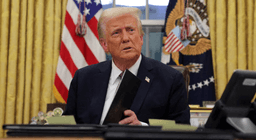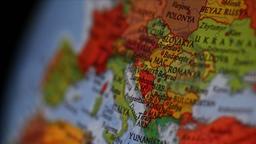
We thought for the first three days that it was a simple cold. But our sickness did not go away. Then, on the morning of 28 March 2020, Zeynep, my wife woke up complaining of severe headaches and pains in her joints. Soon her temperature rose to 38.5 C. Realizing what might be happening I immediately contacted our friend, Prof Dr Haluk Özen, Rector of Hacettepe University in Ankara, one of Turkey's best medical facilities. We were advised to go straight to the Department of Infectious Diseases at the Hospital.
Upon our arrival, we saw that a new, special service area had been constructed just outside the Emergency Service to assist Covid-19 patients. Initially they checked our temperatures and recorded it. We were then directed to the unit for Infectious diseases, located in the same premises. My wife was admitted to where a Covid-19 test was administered, followed by an X-ray. More important, a computer tomography scan was promptly performed upon her.
Hospital staff informed us that the test results would take two or three days to come through. It was emphasized that we would be contacted after the results of the detailed lung examination. In the event, a phone call came through not long after we got back home telling us to return immediately, as there was indication of pneumonia in my wife’s lungs. As she was feeling very weak, I asked if she could return in the morning instead. They responded by saying it was absolutely obligatory to come back. So we went back to the hospital late at night where she was admitted to the special Covid-19 Ward with single rooms for every patient. This was a specially isolated ward, where all medical personnel looked as if they were dressed for a space-walk.
In my case, since there were no symptoms (yet), and in accordance with the algorithms, I was told that I could return home. However, next morning, a specialist doctor from the infectious diseases department called and told me that I too should come to the hospital to be tested because of my wife's condition. The test was performed, and I was told also that the results would take about two to three days, but that the x-ray and computed tomography would give clues. I went back home again. The following day, a pulmonologist called saying that the hospital had spotted a problem in my lungs and that I should be hospitalized as well.
So on the morning of April 2, I was taken into the hospital by ambulance. My sense of taste and smell were both gone and my fever had risen. All these comings and goings between our home and the hospital may sound a bit confusing. But I was well aware that our cases were being handled by specialist medical staff working very long hours during which they examined and treated a large number of patients.
For five days, my wife and I shared a room in the special Covid-19 Ward of Hacettepe Hospital, specially prepared to combat the infamous Virus. At this point I should perhaps tell you something about the medications we received. For this was a hard fight and not a question of just waiting for the disease to pass. We were administered a variety of anti-viral drugs such as "Enfluvir" ("Tamiflue” and "Plaquenil", as well as gastro protective "Pulcet".
Our temperature, blood pressure and oxygen saturation levels were monitored or checked on hourly basis. The next morning, an antibiotic, "Azitro" was added to the list of medicines. Both of us suffered from diarrhoea, a feature of many Covid-19 infection. Then, we were given an initial dose of eight tablets of “Avigan” and/or “Fovipiravir”, which my wife called our "Chinese Girls", due to the large number and the origin of Chinese tablets, to alleviate pain and fever. On the other hand, since "Plaquenil" with quinine may not be given for more than five days, it was stopped after a further two days. Gradually, the doses of “Chinese” tablets were reduced too. After her lung tomography showed improvement second time around and her test results were negative, she was discharged after ten days in hospital.
On the other hand, doctors informed me that my oxygen saturation had started falling below accepted levels, which meant that I now had to be immediately transferred to the Intensive Care Unit. I was now in the ICU unit which would last a further twelve days. In ICU, I stepped into a new adventure, one in which a mask constantly covered my nose and mouth and numerous devices were attached to my body. There were cables that were connected to the electro-device monitoring my heartbeat, and another device attached to my finger checking oxygen saturation levels. At one point, due to deterioration in my condition, a search was made for a plasma (from a recovered donor who had Covid-19 and in my blood group), but this was not needed later.
Instead, the doctors treating me took the decision to make a second search this time for “IVIG” (Intravenous Immunoglobulin) therapy. This therapy was given intravenously for two days each lasting about six hours. Moreover, also on different days, various serums containing supplements such as vitamin C and Zinc, antibiotics, sodium and magnesium supplements were administered. From time to time anti-nausea medications were also given intravenously. X-rays were taken with a special device brought to my glass cubicle, full of an array of complex medical equipment. I also received computed tomography scan.
In the meantime, to my dismay, I started having difficulties in my mobility due to muscle and weight loss. Moreover, the arrival, every three-hours, day and night, of nurses and healthcare providers wearing special clothing and the constant administration of intravenous medication began to adversely affect me psychologically. On the other hand, I began to focus mentally on surviving. I needed to get out of ICU to be able to be together with my wife, son, and grandchildren once more. I realized the cure would depend on me.
However, new discomforts kept on popping up. Due to the numerous intravenous treatments I got phlebitis (inflammation of the veins) in my left arm. So the twice a day intravenous administration of an antibiotic "Augmentin" also began, along with that of blood thinners "Oksapar" and/or "Enox”. Supplies of these were difficult to find because of the increasing number of Covid-19 cases at that time.
Life continued like that twenty four hours a day in my bright, small glass unit. Then one morning the consulting doctors, came and stood in front of my glass door while on their usual tour, and told me that they were thinking of decreasing the volume of my oxygen support, adding that if this trial produced successful results, I would be able to breathe normally again within a week. That would be my ticket out of the ICU.
Naturally I replied with great enthusiasm “Yes, I can do it!” They also added that I would to lie prone position face down. At that time I did not even have the strength to change my position in the bed! Besides, that was not without its complications either. I was laid face-down with the help of a healthcare worker, but one night I woke up in extreme pain, as the intravenous serum needle had come out. During another night's trial of lying in the prone position, I woke up in a mess as the medical cables connected to various parts of my body had got tangled up. I could only to get rid of this tangle with the help of one of the nurses.
On the ninth day in ICU, my doctors reported they would now attempt to reduce the amount of oxygen support. This was great news for me and boosted my determination. I insisted in sitting up-right on a chair for two to two and a half hours a day. The young therapist, who helped me overcome some muscle loss and to practice breathing exercises every morning believed I could do it. Continuing to exercise while sitting contributed greatly to the improvement of my oxygen saturation levels. Eventually, at the end of my twelfth day in ICU, doctors told me that I could now move into the special Covid-19 Service Ward. I could not hold back my tears. As I left, the intensive care workers, doctors, nurses and healthcare professionals applauded me in what has now become a ritual. I applauded them in turn with a deep sense of gratitude.
This time the Covid-19 Ward, was on another floor and was a different room. Routine checks, day and night of fever, blood, and other relevant tests continued during three more days. I felt very emotional once again when the Deputy Head of Department came to my visit (again wearing highly protected clothing) to inform me that I would finally be discharged on April 22, 2020.
This would be followed by a strict 14-day quarantine period.
After that came eventually a return to the hospital for a final check-up, involving blood tests, x-rays, and a physical examination. My wife and I both completed these examinations. I also had a special interview and physical exam by the ICU doctors. Both I and my wife were shown to be now Covid-19 negative. What a relief after that long ordeal.
Numerous nurses, healthcare providers, and doctors have made tremendous effort to bring me back to life: for me they are all heroes to whom I will always be grateful. Also, my gratitude goes to some friends who found solutions to some critical issues we faced in the course of our illness outside the hospital. In addition, I am grateful to the Rector of Hacettepe University, Professor Haluk Özen who created such a well prepared and well-run centre to combat Covid-19.
Above all I am also grateful to my wife, Zeynep, for her patience and psychological support, and the constant flow of information she provided about the course of the treatment. Out of hospital and recuperating, she remained in contact with me day and night, despite being herself in the 14-day quarantine period, and alone at home. I am also grateful to my son who supported us in every sense. Meanwhile, the attentiveness, support and good wishes of many friends have also helped me in my convalescence period.
I would also like to express my appreciation to Assoc Prof Dr Çağkan İnkaya, Prof Dr Tomris Türmen and Prof Dr Emel Cabi Ünal, with whom we were in constant contact. The ICU team of Prof Arzu Topeli İskit, Assoc. Prof Serpil Öcal and Assist. Prof Burçin Halaçlı deserves a special gratitude.
I am also indebted to the Turkish Ministry of Foreign Affairs, and especially the Minister of Foreign Affairs and Deputy Ministers for their support.
Everyone's Covid-19 ordeal may be different. Some will undergo it unknowingly, while others may be carriers, many will go through it alone at their homes. So the conclusion I would share with you after my illness is that I strongly emphasize the vital importance of maintaining a safe physical distance, and of using masks and gloves while following strict rules of personal hygiene, especially hand-washing. These are at the centre of the only defence we have as yet against the Covid-19 pandemic.





